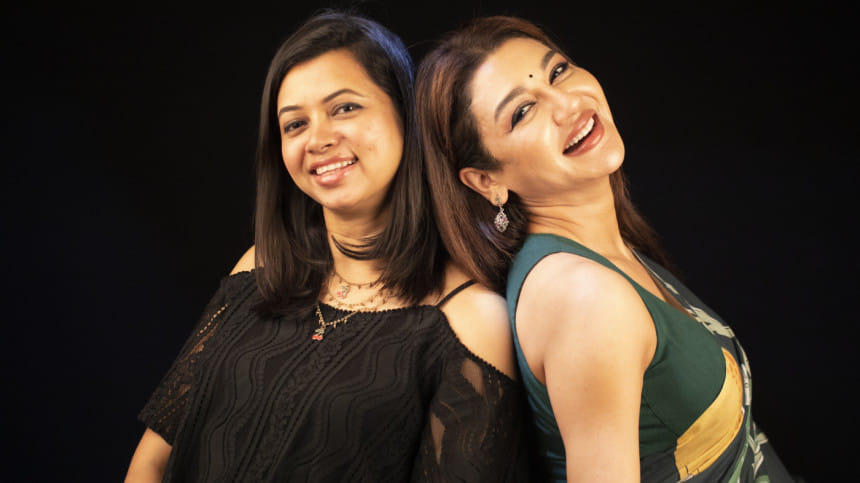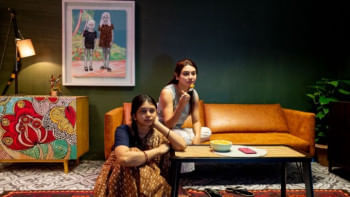Jaya and Sharmin take over

The stench of hexisol and death surrounds the gloomy capital. Formerly known as the hub of Bangladesh, Dhaka resides in an eerie, desolate moment in history – the Covid-19 pandemic. An unlikely pairing of a middle-class woman and her house help, in spite of all social barriers, make an unlikely bonding that defies convention and become each other's crutch for survival in the soul-cleansing flick that is Piplu R Khan's "Jaya aar Sharmin".
As Jaya Ahsan and Mohsina Akhter, the two leads of the film, take sips of black coffee and rong cha respectively at The Daily Star's studio, the excitement levels vary among the illustrious mega-star and respected theatre practitioner. "We learned nothing from the pandemic," Jaya Ahsan sighed at one point in the interview. "We should have taken that as a warning that it is unwise to go against nature, to learn empathy and tolerance, but many, including myself, have forgotten." The National Award-winning actress further emphasised that going back to the pandemic days, in an earthly story about two wandering souls, would rekindle the comradery and the sense of community that was built then. "However, it is indeed heartening to see the reaction that the film got, I was taken aback by the kind messages that people sent, and the reviews on social media," said Jaya.

For Mohsina Akhter, it is a breakout role in films, especially after travelling all over the world as a renowned theatre artist. "It was a scintillating experience, especially because the freedom that I was given by Piplu bhai – at first, I genuinely thought that he would not let me improvise as I do on the stage, but I was taken aback when he told me to 'go for it'.
Evidently, Mohsina's performance as the layered Sharmin evokes a range of emotions for the viewer. These emotions in front of the camera had an unintended spill over effect. The director had staged the set in a way that the cameras were not as visible, and the suspension of disbelief was at its peak. "Regardless of if the cameras were rolling, we were simply Jaya and Sharmin – the characters – going about their day. We were not in character, we simply were. This is why the audience will find it easy to connect with us," said Jaya Ahsan.
The artistes reminisce fondly of a time when they had to maintain an unscrupulous amount of distancing, when they were forced to shoot the film with severe limitations, which includes the lack of a supporting technical crew, including a makeup artist. "I do feel that it was charming, eye-opening even, that we went through that," echoed the actresses.

"Jaya aar Sharmin" comes at a time that cultural personalities, and progressives in general, are under attack by right-wingers. In response to my curious query of how it affects them and how the artistes have decided to fight the 'cultural' war, Mohsina's answer is simple: "We have to resist. Through our art, through social discourse, through simply being more humane, we have to resist, and promote tolerance, there are no two ways about it."
On the other hand, Jaya Ahsan has been fighting another fight for years – that of promoting awareness on violence against animals. "I believe that I get much more credit for that than I should," she states ever-so-humbly. "There are actual heroes out there who have dedicated their lives to those who cannot speak." As Eid-ul-Azha looms around the corner, the actress has but one request for her fellow countrymen: "In the season of sacrifice, please make sure to be humane towards the animals that we will sacrifice. Let's not hurt them unnecessarily, and keep them comfortable before the sacrifice is made, that is the true spirit of this season."
As "Jaya aar Sharmin", jointly produced by C te Cinema and Applebox films, continues to receive praise for cinemagoers, the actresses believe that the movie, surpassing its box-office legacy, will leave a humane mark on the viewer unparalleled to any other experience that they've had.

 For all latest news, follow The Daily Star's Google News channel.
For all latest news, follow The Daily Star's Google News channel. 








Comments